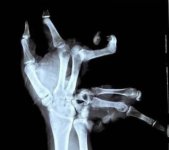You are using an out of date browser. It may not display this or other websites correctly.
You should upgrade or use an alternative browser.
You should upgrade or use an alternative browser.
Artificial lack of intelligence?
- Thread starter tcabot
- Start date
murathan
Was a Bassoonist
A.I. is a part of getting "replaced by robots". Many jobs are already replaced by digital systems. The A.I. makes that further for a thinking robot, making the abilities of a robot to every job you can imagine. Evolution process in real life takes at least thousands of years while time factor is almost instant in modern advanced computers. When something is about to start to change peoples lives, they open these free to make people used to, to make more acceptable the change.
SteveBox
Well-known member
That is the mental image inside the mind of the non-player who is frightened by the mere thought of learning how to play "all those buttons".
There are two sides to every coin. If we are to have Artificial Intelligence, then don't we also need Artificial Stupidity? I think that picture qualifies as the latter.
There are two sides to every coin. If we are to have Artificial Intelligence, then don't we also need Artificial Stupidity? I think that picture qualifies as the latter.
Accordion Eric
Newbie
At least the AI got the right amount of fingers this time, but those thumbs look real long.
Dingo40
Been here for ages!
Looks like a finto PA
I tend to call it AS, for Artificial Stupidity.
All such generated images I have seen so far get the layout of both the treble and bass sides wrong.
All such generated images I have seen so far get the layout of both the treble and bass sides wrong.
After many years of playing scales, the hand of a PA player mutates (evolvesbut those thumbs look real long.
For a professional 3-row CBA player it's a lot worse than that!
Attachments
Yeah, we’re still working on it. It’s getting closer. Much better than when I started and I am using a very primitive (spelled “free”) generator. I talk to my daughter about how she uses AI in her job. I could have saved a lot of time in mine with judicious use of AI. Yes, it will replace some jobs, no doubt. But I would worry more about other human failings first, like invading armies. Now there is some serious job loss. Technology always replaces jobs. Talk to any old handmade reed maker….
Remember, this is a “painting,” it’s not supposed to be “real.” Kind of like a Roland.
Just saying.

Remember, this is a “painting,” it’s not supposed to be “real.” Kind of like a Roland.
Just saying.

Last edited:
Aaron
Member
How are these people playing without straps?
I always refer to it as AS: Artificial Stupidity.
AI learns from huge collections of rubbish found on Internet. And as you probably know: garbage in, garbage out.
AI learns from huge collections of rubbish found on Internet. And as you probably know: garbage in, garbage out.
Straps only exist to restrain your creativity!How are these people playing without straps?
It’s fun! It’s entertaining! Who cares? How often do you get to experience the change and development of such a giant cultural phenomenon? (Both for good and evil). But to diss the whole technology because it missed a strap or made 4 fingered hands would be like dissing a digital….never mind
murathan
Was a Bassoonist
SteveBox
Well-known member
And those keyboards are a little funky.How are these people playing without straps?
…..and J S probably didn’t have glasses like that!And those keyboards are a little funky.
KiwiSqueezer
Active member
Well, we can all see that the AI images are impressive, but fundamentally wrong. We are familiar with a range of 'correct' outputs. However, most of us wouldn't immediately recognise an AI's protein-folding suggestion as wrong - or right. The problem is so complex that the protein structure presumably has to be taken on trust - at least at present.
AI doesn't (yet) have understanding, so it doesn't recognise its mistakes. The algorithms employed are far too complex for humans to understand, so it's often difficult for humans to understand how, why or where a complex algorithmic system made an error. The danger is where AI-generated results are believed by humans, and are implemented in areas where error can't be tolerated. Especially in novel areas of activity, it may be impossible for a human to recognise that the AI output is garbage, and also impossible to 'trouble-shoot' the system to prevent similar, future errors. I'm in no hurry to be driven by an AI-controlled vehicle, when anticipation and experienced judgement are vital and can save lives.
AI doesn't (yet) have understanding, so it doesn't recognise its mistakes. The algorithms employed are far too complex for humans to understand, so it's often difficult for humans to understand how, why or where a complex algorithmic system made an error. The danger is where AI-generated results are believed by humans, and are implemented in areas where error can't be tolerated. Especially in novel areas of activity, it may be impossible for a human to recognise that the AI output is garbage, and also impossible to 'trouble-shoot' the system to prevent similar, future errors. I'm in no hurry to be driven by an AI-controlled vehicle, when anticipation and experienced judgement are vital and can save lives.
Similar threads
- Replies
- 52
- Views
- 1,647
- Replies
- 5
- Views
- 1,533





